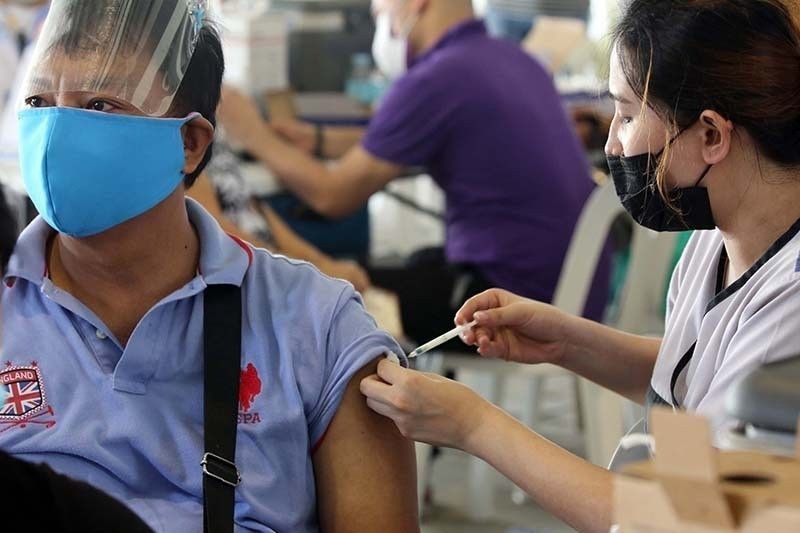All set for start of pediatric jabs

MANILA, Philippines — With the necessary operation guidelines drafted, all is set for the inoculation of minors aged 12 to 17 against COVID-19, vaccine czar Carlito Galvez Jr. said yesterday.
“We want the vaccination of the younger population immediately,” Galvez said. “The initial rollout will only involve a couple of thousand individuals under the age group. It will be phased, monitored and sequential.”
By phased, Galvez explained that the first to be inoculated are those aged 15 to 17, to be followed by those in the 12 to 14 age bracket.
There will be six pilot sites for the initial vaccination of minors – the Pasig City Children’s Hospital, Philippine General Hospital in Manila and the Philippine Children’s Medical Center, National Children’s Hospital, Philippine Heart Center and the Fe del Mundo Medical Center, all in Quezon City.
Galvez, the National Task Force against COVID-19 chief implementer, said they plan to expand the vaccine rollout for minors to select local government units (LGUs) in the National Capital Region (NCR), among them Taguig, Makati and Mandaluyong cities.
After 30 days of the rollout, the vaccination program will be opened to the rest of the NCR, including other regions that have inoculated at least 50 percent of their senior citizens or A2 group.
Health Secretary Francisco Duque III, chairman of the Inter-Agency Task Force for the Management of Emerging Infectious Diseases (IATF), said the rollout for this particular age group requires parental consent.
It was also decided that minors would only be vaccinated in hospitals to ensure their safety in case any adverse effects following inoculation require immediate medical attention, Duque said.
Earlier, the NTF announced that the vaccination will be limited to children of health care workers and minors with comorbidities as reflected in their consultation records with the hospitals concerned.
Metropolitan Manila Development Authority (MMDA) Chairman Benhur Abalos said LGUs in the capital region have long started the pre-registration of minors in the age group to prepare for the rollout and determine the number of those qualified, including those with comorbidities.
At present, Galvez said about 12.7 million are qualified to receive the jab, but the NTF will allocate 60 million vaccine doses for this age bracket estimated to total between 26 and 29 million nationwide.
Vaccination completed by February 2022
With the NTF on track to inoculating at least 50 percent of the country’s target population by yearend, the vaccine czar is confident the vaccine rollout could be completed by February next year.
“Our plan is to finish the vaccination of the people by February, before the election period. So in case there are violations (on minimum public health standards), at least the people are vaccinated,” Galvez said.
The Philippines has secured a total of 187.6 million doses of COVID-19 vaccines for 2021, of which 77.4 million doses have been delivered since February and 31 million of these currently stockpiled.
Last night, an additional shipment of 939,510 doses of the Pfizer vaccine arrived in the country while 661,100 doses of the AstraZeneca vaccine are set to arrive tomorrow morning.
Secretary Vivencio Dizon, NTF deputy chief implementer and testing czar, said this supply supports the continued expansion of the vaccination coverage for Filipinos.
“Supply is no longer a problem. That’s why the President approved opening it to the general population. This means anyone who wants to be vaccinated will be inoculated,” Dizon said.
The NTF’s goal now is to sustain a vaccination rate of 600,000 to 800,000 jabs daily by yearend.
Galvez also expressed optimism that the total vaccine deliveries by the end of this month would breach the 100 million mark and even hit 160 million doses by yearend.
These supplies, he said, are sufficient to achieve the full vaccination of 50 to 70 million Filipinos by the end of 2021.
NVP recalibration
Reporting to President Duterte last Monday, he said he is recalibrating the national vaccine program (NVP) to ensure the sustainability of supply, secure access to latest generation vaccines and complete the immunization of 80 to 90 percent of the population by the first quarter of 2022.
“In order to achieve an effective population protection and herd immunity, we need to level up to 80 to 90 percent because we have seen the experiences of other countries like Singapore and Israel,” Galvez said.
The Vaccine Expert Panel (VEP) is assessing and evaluating the safety and cost-effectiveness of various vaccines in light of the emergence of different COVID-19 variants and the development of reformulated boosters and new generation vaccines.
Galvez said the panel will be submitting this quarter a new COVID-19 vaccine portfolio that will be the basis for procuring the country’s supply for 2022.
At present, negotiations are underway with four manufacturers for the procurement of 90 to 100 million doses, he said.
Funding vaccines
In a coordinated effort, the Department of Finance (DOF) has started preparing funding arrangements for the procurement of next year’s supply requirements.
Last Tuesday night, Finance Secretary Carlos Dominguez III said the plan is to secure another $900 million (roughly P45.5 billion) in loans for booster shots.
“The NTF, DOH and DOF have initially identified multilateral and bilateral financial institutions as possible sources of funding for this allocation,” Dominguez told reporters.
Earlier, the government earmarked P45.3 billion that would be sourced through multilateral loans from development partners such as the World Bank, Asian Development Bank and the Asian Infrastructure Investment Bank.
“Exploratory discussions with the ADB, AIIB and the World Bank have been initiated to help determine possible funding sources for additional vaccine requirements in 2022,” Dominguez said.
He said the loan agreements will be completed by the end of the year, making sure that financing will be obtained in time for the enactment of the national budget for 2022.
Programmed appropriations
Lawmakers deliberating the provisions of the 2022 spending plan have demanded the economic team to transfer the allocation for booster shots to programmed appropriations.
In August, House Deputy Minority Leader Stella Quimbo said unprogrammed items will only be realized if the government beats its revenue target. As such, she warned that booster shots may just be purchased if collecting agencies earn more than they should next year.
As of September, the government has acquired a total of $22.51 billion (about P1.14 trillion) from multilateral lenders to bankroll its measures in managing the pandemic.
For this year, it looks to borrow P3.07 trillion to cover a budget deficit expected to reach P1.85 trillion, or 9.3 percent of the economy.
Moving forward, the government will decrease its borrowings to P2.47 trillion in 2022 and P2.31 trillion in 2023 in an effort to bring down the fiscal deficit to pre-pandemic levels.
The country’s outstanding debt, however, has risen to a record P11.64 trillion as of end-August and is projected to reach P11.73 trillion by the end of the year. – Rudy Santos, Elijah Felice Rosales
- Latest
- Trending



























